| 1. |
_______________ options add structural capacity to the existing pavement system and do not require bonding to the existing pavement. |
|
|
Unbonded overlay |
|
|
Bonded overlay |
| 2. |
Evaluating the existing pavement condition is an important part of the pavement preservation and rehabilitation process. Which of the following is an Optional evaluation activity? |
|
|
Historical data collection, records review, and future projections |
|
|
Condition assessment profile |
|
|
Core analysis |
|
|
Pavement evaluation report |
| 3. |
Which of the following picture shows Stringless paving operation using GPS ? |
|
|
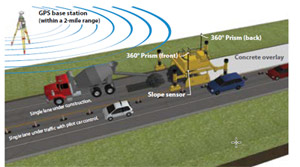 |
|
|
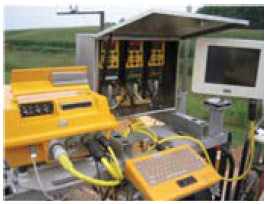 |
|
|
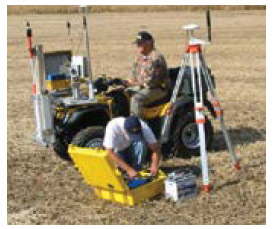 |
| 4. |
Steel fibers with a much higher density than synthetic fibers will weigh much more than synthetic fibers at the same volume in the concrete mixture. |
|
|
True |
|
|
False |
| 5. |
When staging a two-lane concrete overlay project under traffic, the widths of the vehicle lane and the construction lane must be considered. Typically, the minimum desirable width for the vehicle lane is _____________. |
|
|
5 ft |
|
|
7 ft |
|
|
9 ft |
|
|
11 ft |
| 6. |
In appropriate dosages, fibers can perform which of the following functions in a concrete mixture? |
|
|
Increase concrete’s resistance to plastic shrinkage cracking |
|
|
Hold cracks tightly together |
|
|
Help increase concrete toughness |
|
|
All the above |
| 7. |
The permeability of a concrete mixture is primarily governed by the amount of water in the concrete at the time of mixing. Permeability will decrease as less water is used. The w/cm ratio should not exceed ______________.? |
|
|
0.45 |
|
|
0.55 |
|
|
0.65 |
|
|
0.75 |
| 8. |
The following picture represents ___________________.?
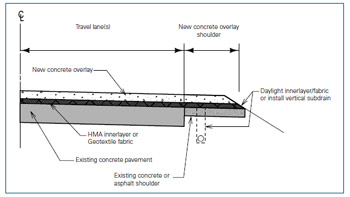 |
|
|
Interlayer outlet for concrete overlay shoulder |
|
|
HMA interlayer outlet for asphalt shoulder |
|
|
Geotextile interlayer outlet with new paved shoulder (concrete or asphalt) |
| 9. |
The following picture represents ___________________.?
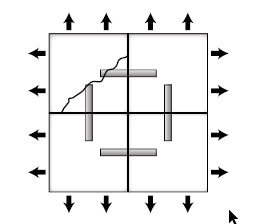 |
|
|
Higher shrinkage restraint in joint intersection with round dowel |
|
|
Joint intersection with plate dowel |
| 10. |
The most common stress relief is a thin layer of asphalt material. |
|
|
True |
|
|
False |
| 11. |
Which of the following properties should be considered in the selection and design of the separation layer____________? |
|
|
Adequate isolation from the underlying pavement to prevent reflective cracking |
|
|
Bedding |
|
|
Drainage |
|
|
All the above |
| 12. |
In designing bonded concrete overlays for existing concrete pavements, it is important that the CTE of aggregates specified for the concrete overlay mixture design have a similar or lower CTE to that of the existing concrete pavement. |
|
|
True |
|
|
False |
| 13. |
When the surface temperature of the asphalt is at or above ______________, sprinkling the surface with water can reduce the temperature and minimize the chance of early-age cracking. |
|
|
120°F |
|
|
130°F |
|
|
140°F |
|
|
150°F |
| 14. |
The following picture represents ___________________.?
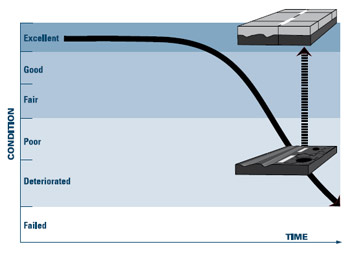 |
|
|
Unbonded concrete overlay of asphalt pavement |
|
|
Bonded concrete on concrete |
|
|
Bonded overlay of asphalt |
|
|
Bonded overlay of asphalt pavement |
| 15. |
The benefits of the dynamic cone penetrometer (DCP)test are which of the following _____________.? |
|
|
Low cost |
|
|
Easy to use |
|
|
Large penetration depth |
|
|
All the above |
| 16. |
Mobile lasers should be mounted as low as possible on the unit to see over obstructions, and the profiling type laser units are mounted at bumper height or lower to maximize accuracy and minimize light interference. |
|
|
True |
|
|
False |
| 17. |
_____________ is a technique that was developed to minimize reflective cracking in HMA overlays. The intent of this technique is to reduce the existing concrete pavement into small sections to prevent reflecting into the HMA overlay |
|
|
Rubblization |
|
|
Recycled concrete aggregate (RCA) |
|
|
Voluminization |
|
|
Pulverization |
| 18. |
As a rule of thumb for bonded concrete overlays, the bond tensile strength may be on the order of ______________ of the compressive strength, and the bond shear strength approximately 4 to 20 percent of the compressive strength. |
|
|
2 to 10 percent |
|
|
3 to 15 percent |
|
|
4 to 20 percent |
|
|
5 to 25 percent |
| 19. |
Typically, when the length of traffic control zones is less than 0.25 mi (0.40 km), a pilot car is not used. |
|
|
True |
|
|
False |
| 20. |
Effective work zone management for all concrete pavement projects, including concrete overlays for maintenance and rehabilitation, involves designing a comprehensive plan of action that has important priorities such as _____________.? |
|
|
Ensure safety of workers and motorists |
|
|
Minimize inconvenience to the traveling public |
|
|
Maintain or enhance cost effectiveness of the project |
|
|
All the above |
|